It’s time again to recognize Winter Park Magazine’s Most Influential People. The program, in its seventh year, recognizes those who — sometimes quietly — make a difference through their professions, their volunteerism, their philanthropy, their talents or their community engagement.
The selectees are presented in the summer issue and celebrated at a big event at the Alfond Inn, which was canceled last year because of the COVID-19 pandemic. It is tentatively scheduled for October 23, outdoors at the Alfond, and will celebrate the Classes of 2020 and 2021.
Here are the people who have already been Influentials. The Classes of 2015, 2016, 2017 and 2018, 2019 and 2020 included: Roy Alan and Heather Alexander, Richard O. “Rick” Baldwin, Jim Barnes, Dan Bellows, Justin Birmele, Anna Bond, Rita Bornstein, Jill Hamilton Buss, Jeffrey Blydenburgh, Daniel Butts, Michael Carolan, Sid Cash, Charles Clayton III, Billy Collins, Grant and Peg Cornwell, Linda Costa, Julian Chambliss, Patrick Chapin, Judy Charuhas, Carolyn Cooper, Chris Cortez, Deborah Crown, Jere F. Daniels Jr., Mary Daniels, Robynn Demar, Mary Demetree, Betsy Gardner Eckbert, Jeff Eisenbarth, Dykes Everett and Andrea Massey-Farrell.
Also: Carolyn Fennell, Bill Finfrock, Allen Finfrock, Meg Fitzgerald, Sue Foreman, Scot and Christine Madrid French, Shawn Garvey, Hal George, John Gill, Alan Ginsburg, Steve Goldman, Sarah Grafton, Elizabeth “Betsy” Gwinn, Ralph V. “Terry” Hadley III, Jane Hames, Larry Hames, Frank Hamner, Ena Heller, Debra Hendrickson, Catherine Hinman, Eric and Diane Holm, Herb Holm (deceased), Charlene Hotaling, and Jon and Betsy Hughes.
Also: Susan Johnson, Gary I. and Isis Jones, Phil Kean, Allan Keen, Linda Keen, Tom Klusman, Randy Knight, Debbie Komanski, Linda Kulmann, Cindy Bowman LaFronz, Jack C. Lane, Whitney Laney, Steve Leary, Fairolyn Livingston, Chevalier Lovett, John (deceased) and Rita Lowndes, Lawrence Lyman, Lambrine Macejewski, Paula Madsen, Jesse Martinez, Brandon McGlammery, Genean Hawkins McKinnon, Joanne McMahon, Micki Meyer, Johnny Miller, Anne Mooney, Ronnie Moore and Patty Maddox.
Also: Alex Martins, Marc Middleton, Kristine Miller, Elizabeth Tiedtke Mukherjee, Stephanie Murphy, Tony and Sonja Nicholson, David Odahowski, Betsy Rogers Owens, James and Julie Petrakis, Jim and Alexis Pugh, Jana Ricci, John Rife, John Rivers, Randall B. Robertson, Laurence J. “Larry” Ruggiero, Greg Seidel, Peter Schreyer, Polly Seymour, Thaddeus Seymour (deceased) and Shawn Shaffer.
Also: Jason Siegel, John and Gail Sinclair, Sarah Sprinkel, Susan Skolfield, Sam Stark, Chuck and Margery Pabst Steinmetz, Bronce Stephenson, Dori Stone, Matthew Swope, Paul Twyford, Bill Walker, Fr. Richard Walsh, Jennifer Wandersleben, Harold A. Ward III, Debbie Watson, Todd Weaver, Bill Weir, Chip Weston, Pete Weldon, Cynthia Wood and Becky Wilson.
On the following pages, please meet the Class of 2021 — which is every bit as deep and impressive as previous classes and, as always, includes some people you may not know as well as some longtime community icons. They come from all walks of life but share a love for Winter Park — and a desire to keep it as special as the founding visionaries intended.
Photography by Rafael Tongol
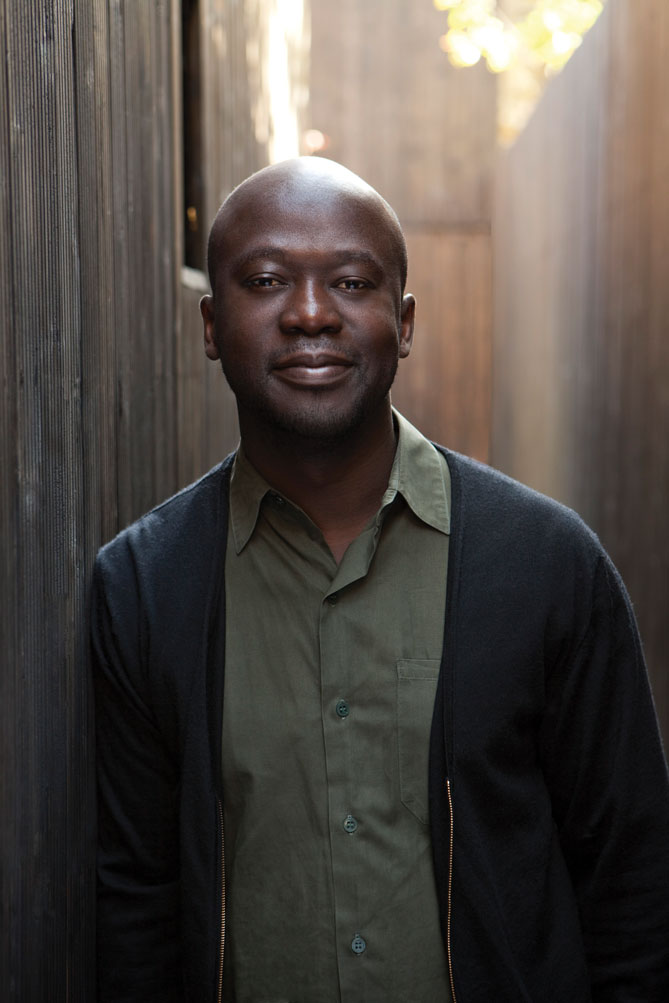
“It’s not so much about big or small as it is about the chance to make a 21st-century community centerpiece that engages the beauty of the park, maximizes social interactive spaces and holds collaborative learning at its core.”
Sir David Adjaye
Principal and Founder, Adjaye Associates
THE ARTFUL ARCHITECT
Sir David Adjaye was born in Dar Es Salaam, Tanzania, and has homes and offices in London, New York and Ghana. But he is surely one of Winter Park’s Most Influential People because he designed, in collaboration with Orlando-based HuntonBrady Architects, arguably the most important civic project ever constructed in the city — the Winter Park Library & Events Center, which occupies a 23-acre site in Martin Luther King Jr. Park. Indeed, the Adjaye factor elevates the $41.2 million campus, which consists of two separate but synergistic buildings, to international significance among aficionados of architecture — stature that not many small-city libraries and events centers achieve. At 54, Adjaye is considered among the most acclaimed architects working today. His commissions include the Smithsonian Institution’s 665,000-square-foot National Museum of African American History and Culture, with three tiers of inverted half-pyramids wrapped in ornamental metal latticework. (In 2017, after the museum opened on the National Mall in Washington, D.C., Adjaye was named one of Time magazine’s 100 Most Influential People.) Other striking Adjaye-designed structures include the 460,000-square-foot Moscow School of Management, with four elongated buildings precariously perched over its large circular base, and the 82,000-square-foot Studio Museum in Harlem, with huge niches on its glass-and-concrete façade to display works of sculpture. Although the Winter Park project is relatively small (35,000 square feet for the library, 18,000 square feet for the events center), Adjaye says he was excited by the opportunity. “I found it incredibly progressive how the city envisaged both the library and events center as a destination,” says Adjaye, winner of the 2021 Royal Institute of British Architects Gold Medal for his body of work. “They understood the potential for this new campus [to offer] lifelong learning, respite and recreation. I was struck by this shared vision to create a dynamic, multifaceted public enhancement on this beautiful lakeside site.” Still, if Adjaye follows local Facebook pages — which he likely does not — then he knows that a vocal minority of armchair architects in this tradition-laden city don’t care for his decidedly avant garde style. Works of art that are both great and convention-defying are often controversial at first but tend to endure over time. Frank Lloyd Wright’s cylindrical design for the Solomon R. Guggenheim Museum in Manhattan, for example, was criticized in the late 1950s but is today considered an architectural masterpiece. Indeed, by hiring Adjaye Associates the city got a world-class design as well as the sizzle that comes from affiliating with a high-profile “celebritect.” Adjaye, it turns out, has an affinity for libraries and an interest in their evolution from “simply repositories for books to spaces for multigenerational social incubating.” His two public libraries in Washington, D.C., were described by the Washington Post as having “well-channeled exuberance, a playfulness that is never merely arbitrary … [they] deserve to be on any serious architectural tour of the District.” In London, Adjaye designed two Idea Stores, which are rebranded public libraries that encompass the attributes of civic centers and exude a hipper, more welcoming vibe. Winter Park’s own destination for social incubation is slated to open in early December of this year after delays caused by two citizen-initiated lawsuits — both of which were thrown out of court — and an unsuccessful effort by newly minted commissioners to “pause” work despite the city’s significant investment in design and site prep. Such contentiousness was perhaps inevitable. After all, the $30 million bond issue that made it all possible was approved in 2016 by barely more than 200 votes. Then costs increased when the city okayed a rooftop venue, a porte-cochere for the events center, a sloped auditorium for the library and an outdoor amphitheater near the lake. No, the project did not carelessly careen “over budget.” It could certainly have been built for $30 million. However, knowing full well that additional sources of revenue would be required, commissioners opted for enhancements. And for the most part, the tab has been covered. Orange County put up $6 million in Tourist Development Tax money after local leaders positioned the project as an attraction for visitors, and the city’s Community Redevelopment Agency (CRA) committed another $1.2 million out of its coffers. The balance was to come from philanthropy, which was bolstered in May when Philip and Sigrid Tiedtke, through the Florida Charities Foundation, donated $750,000 to build the amphitheater — which will be named, appropriately, Tiedtke Amphitheater. In any case, commissioners who engaged this unconventional architect — and took a calculated risk on paying for upgrades to his spectacular design — have already seen their judgment vindicated. “Civic projects are very much at the heart of my practice,” says Adjaye. “It’s not so much about big or small as it is about the chance to make a 21st-century community centerpiece that engages the beauty of the park, maximizes social interactive spaces and holds collaborative learning at its core.”
THE BOTTOM LINE:
Adjaye may never again visit Winter Park after the ribbon is cut on the Library & Events Center. But his name will be prominent in local history books written decades from now as the architect who designed the city’s internationally acclaimed social and intellectual centerpiece.
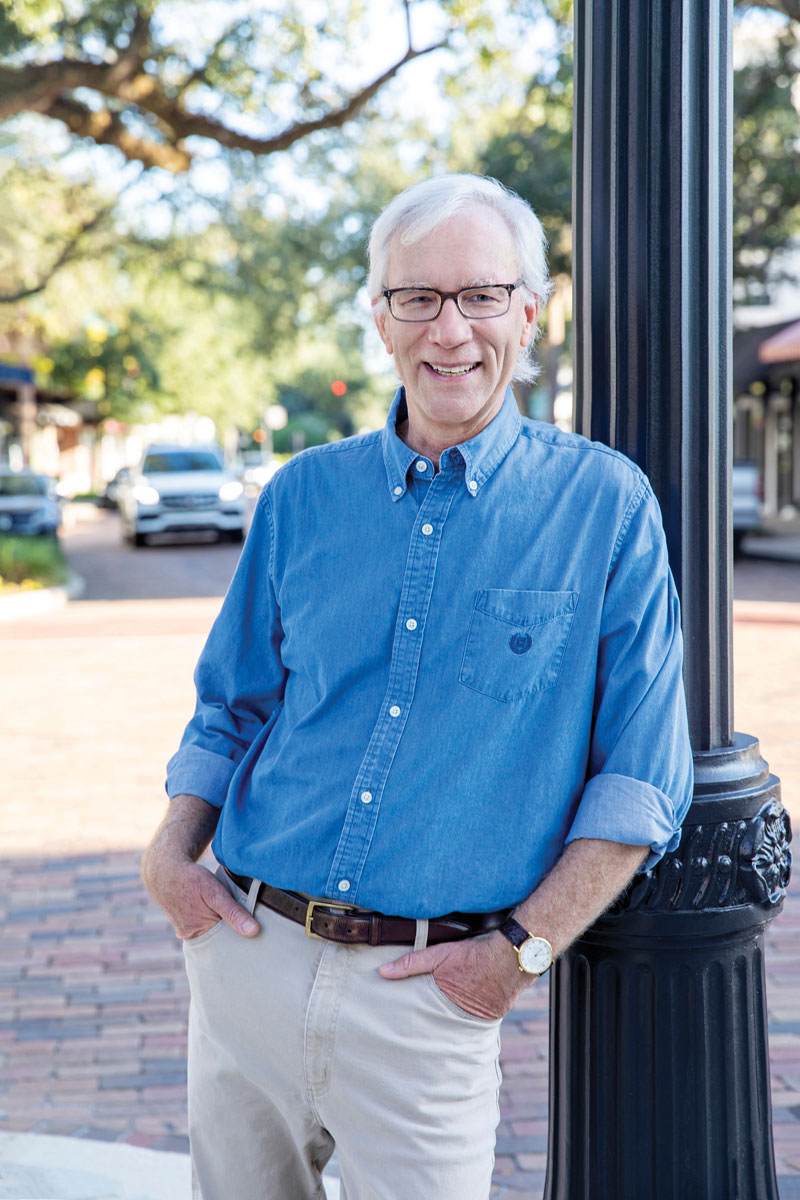
“We should do things through the lens of a plan instead of a lens of exceptions. Residents should feel like they’re being heard, and their feelings are what we’re acting on. They shouldn’t have to stay up until 3 a.m. worrying about what the commission might do.”
Phil Anderson
Mayor, City of Winter Park
THE VILLAGE’S VOICE
Mayor Phil Anderson’s campaign had his name plop-ped right in the center of his ubiquitous yellow-and-blue signs. That’s appropriate, Anderson says, “because I’m a centrist; I want to be a bridge that unites people.” In March, Anderson, 61, a civil engineer by training and now a semiretired developer of senior-living communities, defeated retired teacher and Florida Virtual School executive Sarah Sprinkel, a former three-term city commissioner who had been one of Winter Park’s most reliable vote-getters. The race was one of those 53-47 splits that have marked several recent campaigns for city office, reflecting not only the fact that two good candidates were in the race but also the degree of factionalism present in local politics. Anderson, a city commissioner from 2008 to 2011, particularly appealed to voters who were concerned that large-scale redevelopment, such as the original Orange Avenue Overlay plan, would damage the city’s legendary village charm. (The plan, with Sprinkel’s support, was initially adopted only to be rescinded shortly thereafter by a newly elected slate of commissioners.) Such issues, Anderson says, wouldn’t be so divisive if the city would do a better job communicating — more specifically, employing strong visuals to show residents what proposed new projects would look like. “Residents need more information that they can relate to,” he says. “We need to move away from the pro-development versus anti-development dialogue that we’re always having.” For one thing, says Anderson, that’s an oversimplification. He notes that his campaign knocked on 4,000 doors, and neither he nor his volunteers found many zealots who could be counted as entirely in one camp or the other. Anderson, at least, can relate to the hurdles developers face when trying to do business in Winter Park. In 2015, a subsidiary of Bridge Seniors Housing Fund Manager — a company co-founded by Anderson two years prior — sought to purchase the city’s Progress Point property at the intersection of Denning Drive and Orange Avenue and develop a two- and three-story senior living facility there. Anderson’s company ultimately withdrew the offer after an array of complications arose, among them: an after-the-fact appraisal that deemed the property worth more than the original asking price; opposition to the proposed use voiced by, among others, Mayor Steve Leary; and uncertainty over how to resolve parking challenges in the area. It was all just as well, says Anderson today, because he’s looking forward to a significant chunk of Progress Point becoming a public park as part of a revised plan for the Orange Avenue Overlay. “We should do things through the lens of a plan instead of a lens of exceptions,” says Anderson. “Residents should feel like they’re being heard, and their feelings are what we’re acting on. They shouldn’t have to stay up until 3 a.m. worrying about what the commission might do.” A graduate of Georgia Tech, Anderson moved to Winter Park in 1998 to start CNL Retirement Properties, a real estate investment trust. He stayed at the Park Plaza Hotel and fell in love with the charming town he viewed from the hotel’s balcony. He later fell in love with the charming Jennifer Devitt, then director of the Rollins College EMBA program, whom he met via a blind date arranged by a friend. In 2004, he proposed to her next to the Memorial Fountain in Central Park. Jennifer had two young girls, Phil had two young boys, and the blended family “was like the Brady Bunch,” Anderson says. (Many locals know that daughter Kimberly Devitt, one of last year’s Winter Park Magazine People to Watch, is director of business development for Maitland-based Corkcicle.) Anderson subsequently served a term on the city commission — during which the national economic collapse posed fiscal challenges — and his family supported (and continues to support) such good causes as the Boys & Girls Club of Eatonville, the Albin Polasek Museum & Sculpture Gardens and the Winter Park History Museum. Anderson is also the founding treasurer of the Winter Park Land Trust, which promotes opportunities for the city to expand parks and greenspace. On top everything else, Anderson, the son of missionaries who lived as a child in the Philippines, is a partner with his brother in an Escambia County Subaru dealership — all of which may delay his longtime dream of traveling the U.S., at a leisurely pace, in a motor home. In the meantime, however, he’ll focus on his goals for Winter Park, which include enhanced communication between the city and the public, upgraded technology (including the laying of fiber optic cabling) to create a “smart city” better able to manage traffic, implementation of measures to boost the post-pandemic economic recovery (he would consider economic incentives to attract new businesses downtown), and adoption of an Orange Avenue Overlay plan that will anger as few people as possible. Most important — and perhaps most challenging — is his goal to “find the center” and, where possible, to achieve consensus instead of contention.
THE BOTTOM LINE:
Anderson becomes mayor at a pivotal time in the city’s history, as its businesses have struggled with economic travails caused by the pandemic and its residents have adopted heatedly opposing viewpoints on major issues (the Library & Events Center, the Orange Avenue Overlay, the Henderson Hotel, etc.). Can Anderson hit a reset button on the tone of civic dialogue and promote informed debate while balancing the need to grow with the importance of preserving the city’s village ambiance?
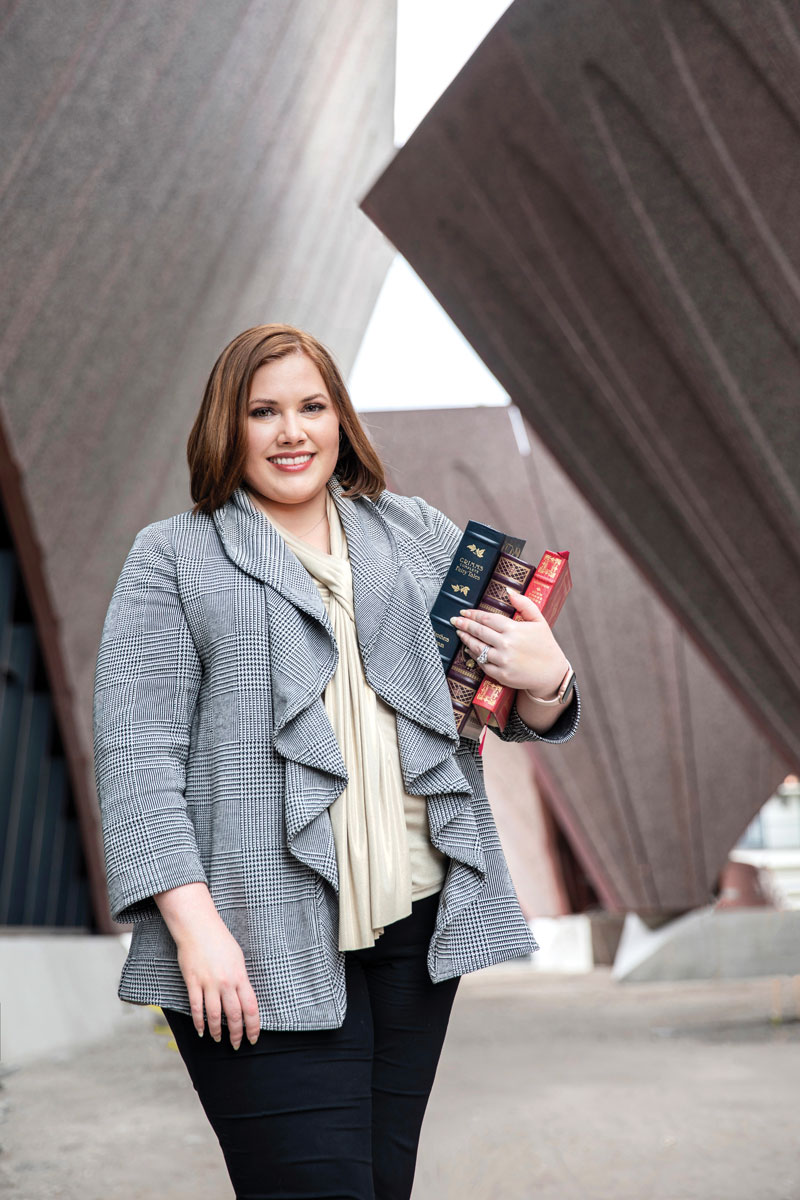
Sabrina Bernat
Executive Director, Winter Park Public Library
THE NEW AGE LIBRARIAN
You’ll have to forgive Sabrina Bernat, 35, for sounding like a kid on a thrill ride when talking about the new Winter Park Library & Events Center set to open in early December: “It feels like the moment of giddy exhilaration as you crest the top of the roller coaster and get ready to scream, laugh and throw your hands in the air. Woohoo!” Bernat, who grew up in tiny Floral City in Citrus County, says the nearest library was in the “big city of Inverness.” With her first library card, young Sabrina checked out so many books that she could hardly carry them. What could be better, she thought, than working at a library? After earning an undergraduate degree in literature and fine art and a master’s degree in library science from the University of South Florida, Bernat did just that in Beverly Hills (Florida) and Kissimmee before joining the Winter Park Public Library in 2015 as assistant director. She became executive director in December 2019, just before construction began on a new library with a companion multiuse civic space and amphitheater. Now, Bernat is busily preparing to move into the state-of-the-art complex taking shape in Martin Luther King Jr. Park — and hopes to win over skeptics who tried so hard to derail the project. “Friction creates energy: plans and ideas changed, people came and went, needs grew or metamorphosed,” she says. “Our community didn’t just build a library — it forged one. We’re ultimately all the stronger for it.” Bernat — whose husband, Mike, is a computer engineer — is the smiling face of a New Age library that she envisions as a place of diversity and inclusivity serving people from “cradle to infinity” and providing “an environment where the serendipity of new ideas sparked by conversation leads to better lives for everyone.” She’s thankful for the staffers “who can take my cheerful nonsense and spin it into reality.” Building the complex has been a roller-coaster ride, prolonged in part by a 2016 bond validation lawsuit that ultimately was thrown out. Bernat — a graduate of Leadership Winter Park, a program of the Winter Park Chamber of Commerce — is cooking up some cheerful nonsense for the grand opening. “There’s a pair of fairy wings hanging on my wall right now,” she says. “I’m sure those are going to come into play!” Woohoo!
THE BOTTOM LINE:
There could be no more effective spokesperson for the expanding role of libraries in the digital age. And that role will be important in Winter Park, where some believed that the old facility was just dandy and the new complex was too costly.
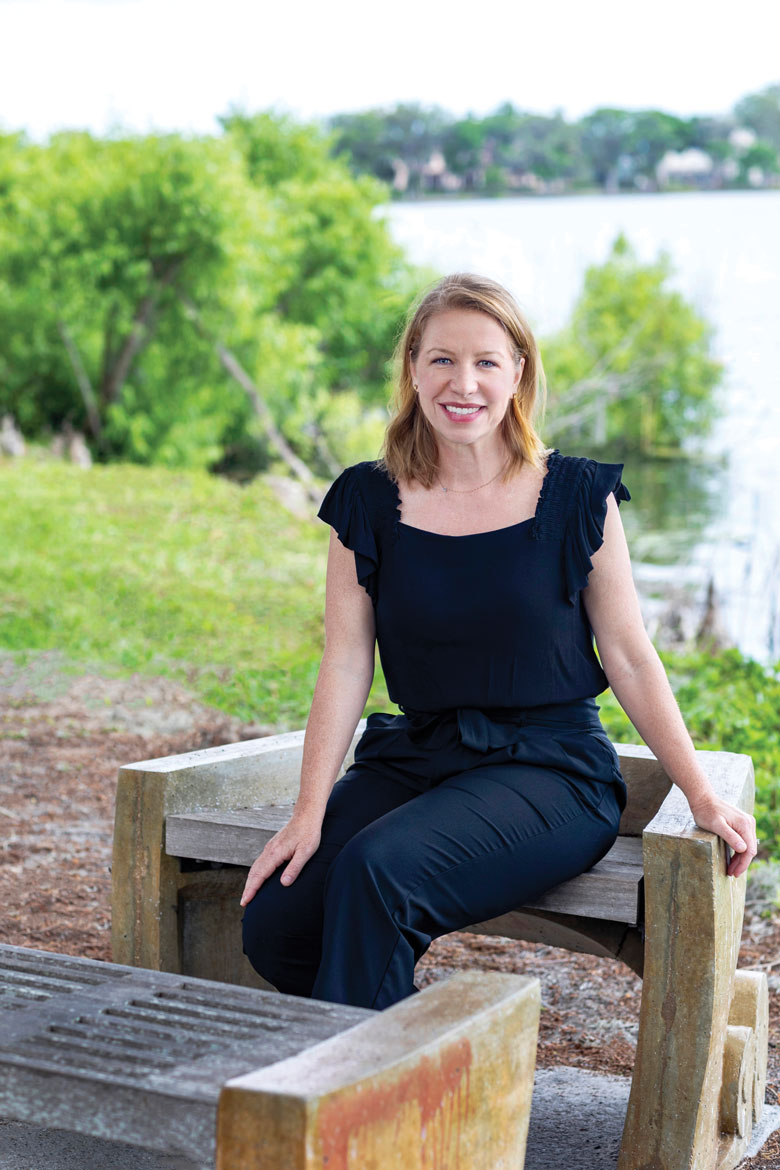
Lauren Bradley
Director of Strategic Communications, Rollins College
THE MESSAGING MAVEN
Lauren Bradley has a gift for writing. But at the University of Florida, when she had to decide her major, she chose public relations over journalism. In public relations, she says, “I can control the message; I can craft it the way I want to.” Bradley has been effectively managing messages for municipalities and organizations for more than 20 years, with the last 12 years at Rollins College — where she’s director of strategic communications and responsible for all internal and external messaging. It’s never boring. “Every day is different,” she says. “There’s always something to learn.” Last year, PRNews named Bradley to its 2020 class of Top Women in PR — professionals whose traits include “the ability to think outside the box to create new programs that drive business results.” Bradley was perhaps born with communications savvy. She’s the daughter of local public relations pioneer Jane Hames and civically active tax attorney Larry Hames (both previously honored as Influentials). But Bradley, 43, has made her own way using a journalist’s instinct for a good story and an advocate’s skill in spinning the narrative. She honed her skills as a public information officer for the City of Orlando and the City of Daytona Beach, dealing with everything from hurricanes to political hubbubs. After earning a master’s degree in mass communications from the University of Florida in 2007, Bradley took an agency job in Chicago, where she also met her husband, Thomas, a digital marketing specialist. But after two winters, she was ready to come home, and Thomas was game. At Rollins, Bradley helped navigate the college’s highly effective response to the COVID-19 pandemic, earning plaudits from PRNews for launching an e-newsletter that kept faculty and staff abreast of the rapidly changing situation. With two daughters, ages 8 and 10, Bradley serves as a troop leader for Girl Scouts of Citrus and is a board member for Goodwill Industries of Central Florida, where her father has been chairman of the board and interim CEO. She’s also a graduate of Leadership Winter Park, a program of the Winter Park Chamber of Commerce. As the pandemic abates, Bradley is crafting happier stories — including the phased opening of Lakeside Neighborhood, an amenity-rich, $71 million student housing project, and the on-campus installation of a large-scale sculpture of Fred Rogers this fall.
THE BOTTOM LINE:
As Rollins College embarks on its most ambitious building program since the Hamilton Holt era, someone with Bradley’s skills is required to maximize its benefit while keeping a curious community in the loop.
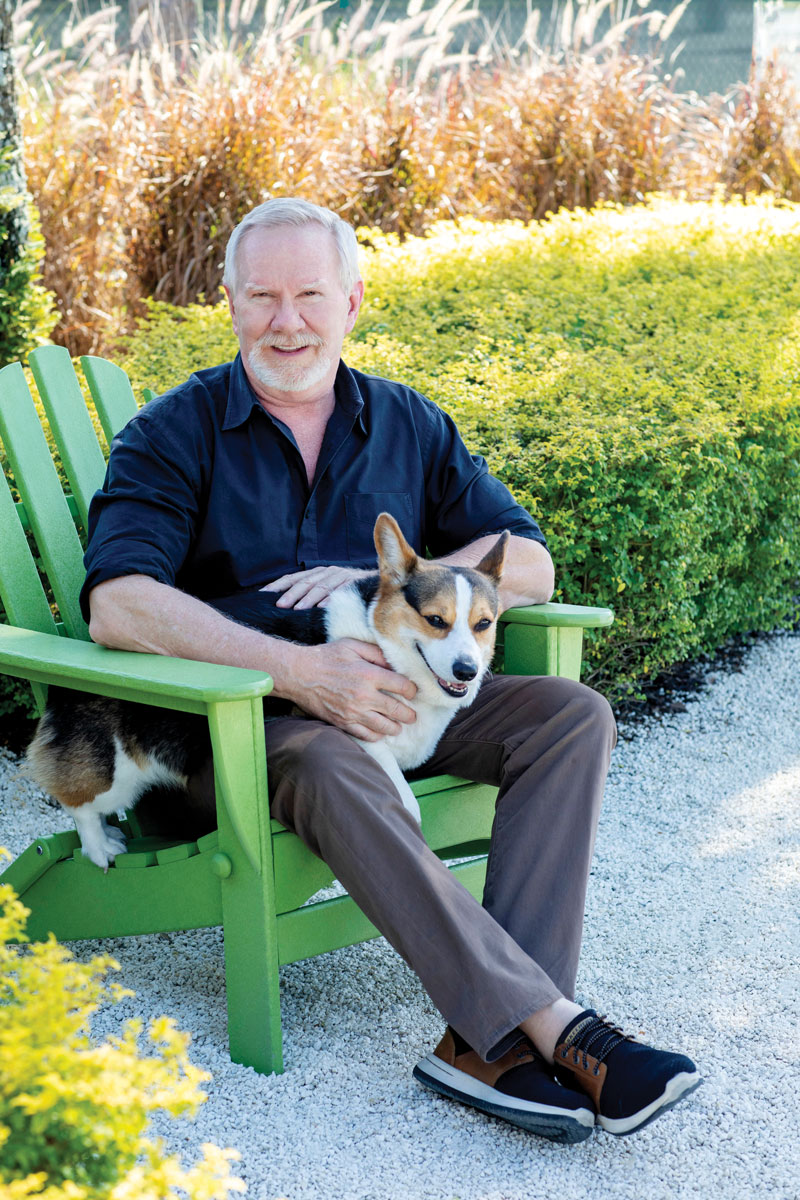
Tom Dyer
Partner, Dyer & Blaisdell Founder, Watermark
THE PRIDE PIONEER
In 1994, when Tom Dyer started the Watermark newspaper to serve Orlando’s growing LGBTQ community, he was trying to influence only one person: Tom Dyer. “The audience for the newspaper was me,” he says. “I knew I was gay and not sure I was thrilled about it. Not sure I could have a happy, open, productive life here without being in fear all the time of how people would react.” Dyer’s influence has grown exponentially since he convinced the man in the mirror. Watermark has been catalyst and chronicler of the LGBTQ community’s emergence as a social, cultural, political force in Orlando and beyond. Some 20,000 copies of the biweekly are distributed in more than 500 locations throughout Metro Orlando and Tampa Bay, while a robust website attracts readers worldwide. “At first, politicians didn’t want to talk to us,” says Dyer, a graduate of DePauw University who attended law school at the University of Florida. “In 10 years, if you were running for office, you really did need to talk to Watermark.” How to gauge the seismic impact? In 1998, a trepidatious City of Orlando allowed the newspaper to hang rainbow flags downtown for Gay Pride Month — and was roasted by televangelist Pat Robertson, who predicted that apocalyptic hurricanes would ravage the wicked city. In 2014 — doomsday averted — Dyer was presented the Key to the City by Mayor Buddy Dyer (no relation), which was just one of many honors for his continuing activism. Dyer’s family, including his four siblings, moved from Wisconsin to Maitland when he was 12. All the kids graduated from Winter Park High School and his mother taught fashion merchandising there. After law school, Dyer joined a small practice in Orlando and got involved with the Metropolitan Business Association (now the Pride Chamber). It was there he began his bridge building, inviting Linda Chapin, then chair of the Orange County Commission, to address the group — the first elected official to accept a speaking invitation from the MBA. “It was a very brave thing for her to do,” Dyer says. “A big moment for Orlando.” Dyer, who turns 66 in July and serves on the education committee of the onePULSE Foundation, sold the newspaper in 2017 to focus on his law practice, Dyer & Blaisdell, having left his Watermark on a transformed community.
THE BOTTOM LINE:
It’s hard to imagine how risky Dyer’s decision to publish an LGBTQ newspaper was as recently as 1994. But the newspaper was in the vanguard of a movement that, within a decade or so, made sexuality virtually a moot point even among most conservatives. Dyer deserves no small measure of credit for opening hearts and minds in Central Florida.
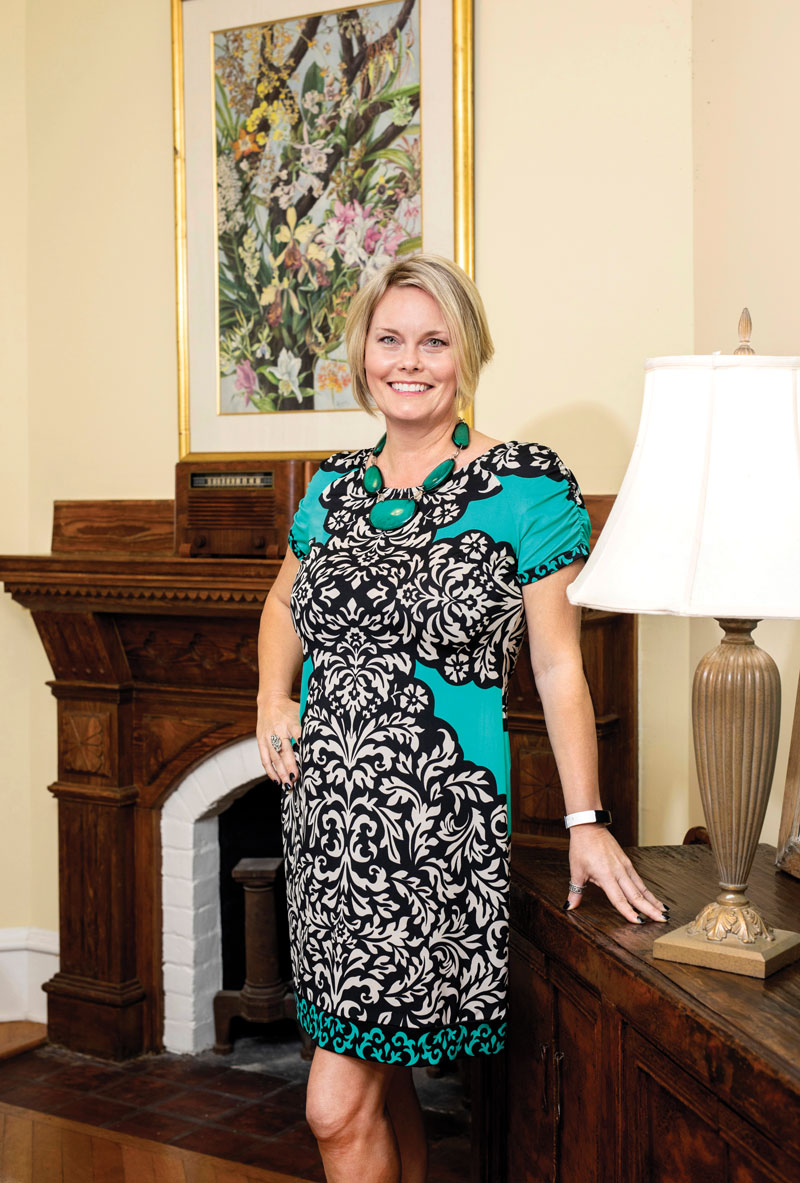
Christy Grieger
Executive Director, Winter Park History Museum
THE TIME TRAVELER
“When people come here, there’s a feeling and an energy that you don’t find in every town,” says Christy Grieger, executive director of the Winter Park History Museum. “[Original developers] Oliver Chapman and Loring Chase created something special that’s still preserved here. History has an echo, and we are its voice.” Grieger, for certain, is its voice these days. The City of Culture and Heritage has plenty of culture to go around — but its heritage is squeezed into just 800 square feet. Nonetheless, the aptly nicknamed “little museum that could” — which occupies a room inside the 97-year-old building that once served as the Atlantic Coast Line’s freight depot — has for years enjoyed an outsized community presence with creative exhibitions and lavish events. Grieger, 48, knows plenty about events. She previously worked in event sales and management at Hello! Florida and, later, at the House of Blues in Disney’s Lake Buena Vista. She then headed human resources at a family-owned printing business before becoming executive assistant to the energetic Susan Skolfield at the museum. When Skolfield departed, the 11-member board of the Winter Park Historical Association — the nonprofit that owns and operates the museum — had a worthy successor already on the payroll. Grieger, who has a sociology degree from the University of Pittsburgh, has always been an achiever. In college, she captained the swim team and broke a school record in the 200-meter backstroke. “Swimming taught me discipline — getting up for practice, setting goals, working as a team member — and sociology taught me about people,” she says. In addition to local history, Grieger — who has two daughters: Ada, 14, and Liv, 11 — enjoys antiquing and is an avid amateur photographer. She’s proud of the museum’s latest exhibition, Rollins: The First 50 Years, and will continue such programs as recording oral histories, offering a speaker series and hosting the annual Peacock Ball. “Penelope — Princess of the Peacocks” will still share stories and songs with children every Monday morning. Yes, the museum may be small, but it manages to draw about 15,000 visitors annually. It’s also efficient, operating on a $248,000 annual budget (including a $76,000 contribution from the city). Entrepreneurs like Chapman and Chase would surely be pleased that the echo of their effort still reverberates.
THE BOTTOM LINE:
Winter Park was built by generations of visionaries from whom today’s civic leaders could learn valuable lessons. Therefore, the museum serves a crucial function by reminding us that the city’s combination of livability and panache is the result of smart decisions spanning more than 135 years.
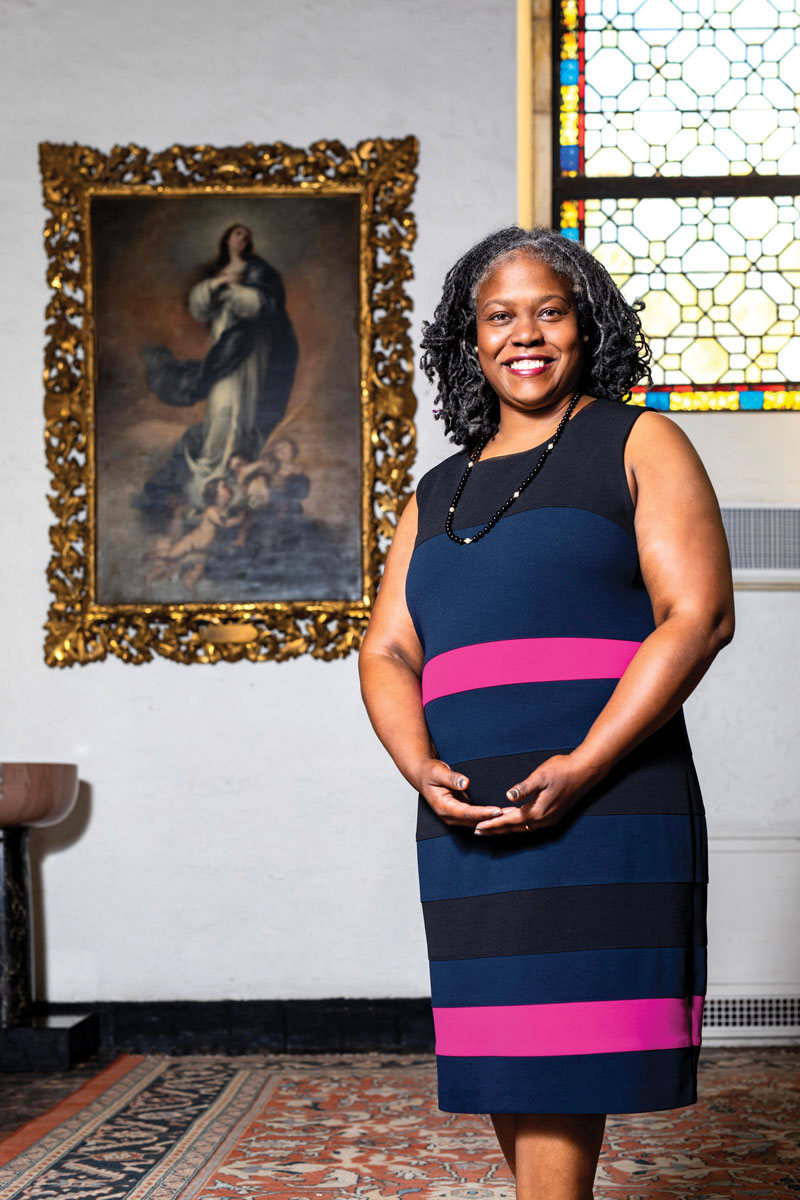
Katrina Jenkins
Dean of Religious Life, Rollins College
THE RELATABLE REV
Katrina Jenkins was doing infrastructure before infrastructure was cool. “I’m here to build bridges,” she said in 2016 after being named dean of religious life at Rollins College, making her the first female, the first African American and the first Baptist to hold the job — which, before she was hired, had been simply called dean of the chapel. Jenkins, however, has an expansive mission to accompany her expansive title. She provides spiritual guidance, mentors students in their spiritual development and advances the college’s mission to foster global citizenship and responsible leadership. Prior to being chosen by Rollins after a national search, Jenkins pioneered interfaith programs at Illinois College, a private school with a long Christian heritage, and Bentley University, a business school in Waltham, Massachusetts. “Religion is messy, spiritualism is messy,” she says. But “The Rev,” as Jenkins is known on campus, loves the mess. “People come as they are. It doesn’t matter if you’re of faith or not, I journey with you.” For Jenkins, it’s a journey that began early. She grew up in Stratford, Connecticut, “one of those wacky kids who enjoyed church. I started volunteering and it was just one of those things that stuck.” She graduated from Syracuse University and, after a short detour in the healthcare industry (pharmaceutical sales and training), returned to her true path, earning a Master of Divinity degree from Yale Divinity School and ordination by American Baptist Churches USA. Jenkins, 52, is ecumenical in her faith outreach and eclectic in her off-pulpit passions, which include science fiction, community theater, the music of Earth, Wind & Fire, and pro sports of every sort — including the Mets (baseball), the Lakers (basketball) and the Cowboys (“God’s gift to football”). Some duties as dean of religious life are those of a traditional chaplain, including conducting worship services at Knowles Memorial Chapel and performing marriages, baptisms and funerals. And then there’s the more complex and challenging task of building a spiritual infrastructure, through which she connects disparate faiths within the college’s diverse international community. She doesn’t expect kumbaya and understands that there’ll be issues and arguments. “But it means we choose to be in a relationship with one another. You might disagree with someone, but you’re not going to call them a hate monger on social media. We choose the opposite of hate.”
THE BOTTOM LINE:
In a time of increasing cynicism and division, Rollins College remains an oasis of understanding and inclusivity. Jenkins will help shape the next generation to be more tolerant, inquisitive and welcoming of differences than this generation has been.
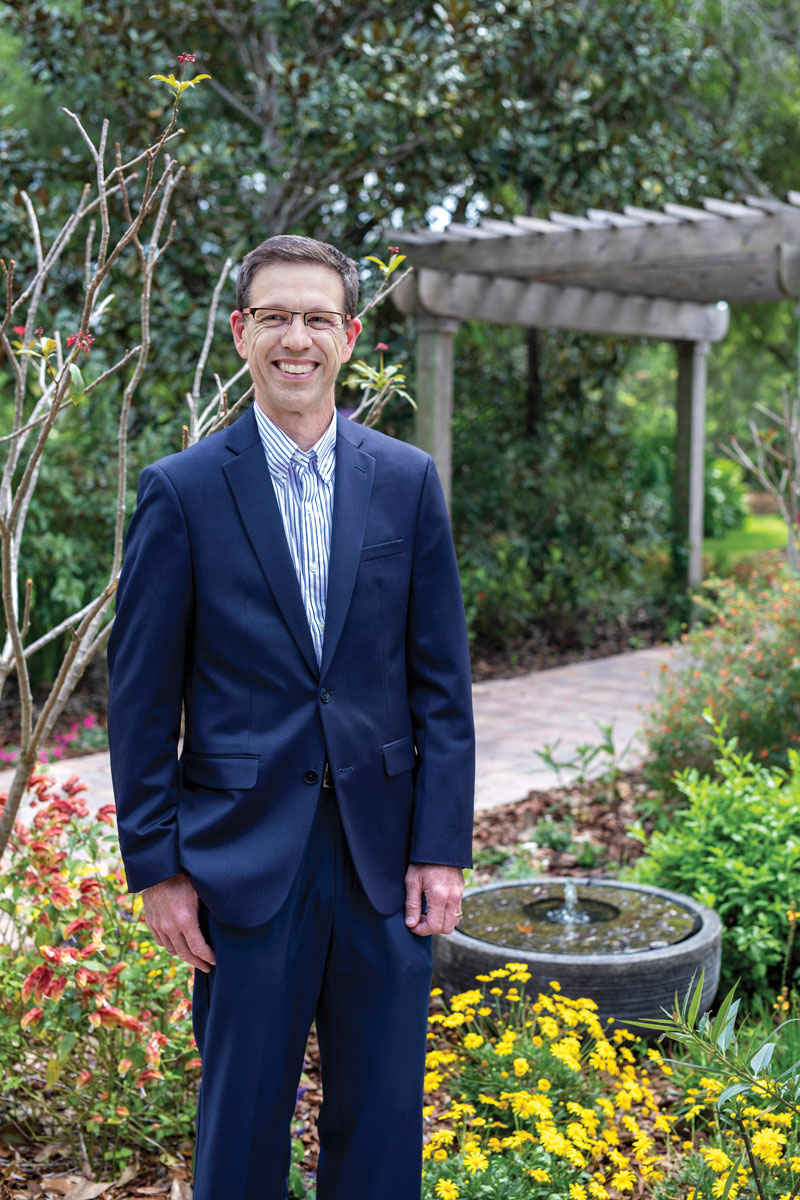
Steve Kramer
President and CEO, The Mayflower at Winter Park
THE SENIOR EXECUTIVE
Steve Kramer, who in just over five years has set The Mayflower at Winter Park on course for the largest expansion in its 33-year history, was hired without any experience running a life plan community. But Kramer, president and CEO since August 2015, had been a manager and executive in the hospitality and healthcare industries for more than 20 years. And he’ll be at the helm as a $108 million project called Bristol Landing at The Mayflower takes shape. Located on 16 acres just west of the existing campus, Bristol Landing will encompass seven buildings with 50 two- and three-bedroom water view apartments, a 9,800-square-foot clubhouse and restaurant, and an 84,842-square-foot healthcare building offering skilled nursing, short-term rehabilitation and memory-care services. Kramer, 51, grew up in Fleetwood, Pennsylvania, where his father was a foreman in a steel mill. Having enjoyed his early employment at an upscale restaurant, he decided to major in hotel, restaurant and institutional management at Penn State. (He later earned an MBA with a concentration in healthcare management from the University of Michigan.) Kramer then spent almost five years in various management capacities at Cracker Barrel Old Country Store, the iconic restaurant-and-gift store chain. Yes, he can whip up a mean batch of biscuits if required, but it’s the company’s simple mission statement, “Pleasing People,” that has stayed with him. From restaurants, Kramer moved into healthcare food service, which in turn led to executive positions at healthcare systems in rural North Central Pennsylvania. Before sunny Florida beckoned, he was president and CEO of North Penn Comprehensive Health Services in Wellsboro, Pennsylvania. Kramer and his wife, Kathy, have one son, Kolby, 19, who has just joined the Navy. Kramer — who became certified as a master scuba diver after relocating to the Sunshine State — is on the board of the Rotary Club of Winter Park and is treasurer of LeadingAge Florida, an association that supports facilities serving seniors. He’s also a graduate of Leadership Winter Park, a program of the Winter Park Chamber of Commerce. The Mayflower, founded in 1989, is consistently ranked among the region’s top retirement communities and is home to some of Winter Park’s most accomplished people. Adds Kramer: “Now we’re going to have additional facilities that not only match but further exceed our reputation.”
THE BOTTOM LINE:
The Mayflower, although it opened in 1989, seems as though it’s been around forever — and has set the bar for other retirement communities in an increasingly competitive market. Kramer will oversee a major expansion designed to help the community maintain and even elevate its appeal among well-heeled seniors.

Deirdre Macnab
Former President, Florida League of Women’s Voters
THE ARDENT ACTIVIST
When she was in college, says Deirdre Macnab, “I was too shy even to stand up and say my name. My father told me being shy was a waste of time.” So she took a public speaking course. Now everyone in Central Florida who cares about democracy, women’s issues and the environment knows her name. So do cable-television hosts such as Rachel Maddow, John Oliver, Al Sharpton and others who’ve had her on their shows to amplify her causes. And so do politicians who’ve tried in the past (they’re still trying, by the way) to suppress voting and to adopt gerrymandered congressional districts. As president of the Florida League of Women Voters, Macnab spearheaded a drive to get two Fair Districts constitutional amendments on the 2000 ballot, both of which passed and eventually — following four years of lawsuits — led to the redrawing of congressional and state senate boundaries. That effort, among other accomplishments, earned Macnab the title “Central Floridian of the Year” in 2012 from the Orlando Sentinel. A native New Yorker from a politically connected family, Macnab earned an MBA from Columbia University and began a career as a consultant and marketing executive in Manhattan. She and her then-husband later moved to Nashville, where she was elected to the school board, and to Atlanta, where she joined a local league chapter to make what civil-rights icon John Lewis called “good trouble.” In 2004, the family moved to Winter Park, where Macnab continued her league involvement — ultimately becoming president — and steered the organization in a more activist direction on a variety of hot-button issues. In 2014, the league and its allies raised a ruckus over a scheme (subsequently abandoned) to purge the voter rolls, and successfully sued the state over a law that placed restrictions on voter-registration drives. These days, Macnab — who takes frequent trips to Colorado to help manage a family cattle ranch — is involved with alliances to protect rivers and promote solar power as well as the league’s initiative to expand the use of electric vehicles. Still, there’s no rest for the weary. Laws that critics say seek to disenfranchise voters have been proposed (or have already passed) in 43 states following the 2016 election. “If called upon I will try to be helpful,” Macnab says. “We need to protect the delicate foundation of democracy.”
THE BOTTOM LINE:
Macnab was flamboyant — often dressing as Susan B. Anthony at public events — but savvy and knew how to navigate the hallways of power in Tallahassee and get things done. Democracy needs powerful advocates these days, and Macnab’s most important legacy may be inspiring other strong women to follow her lead.
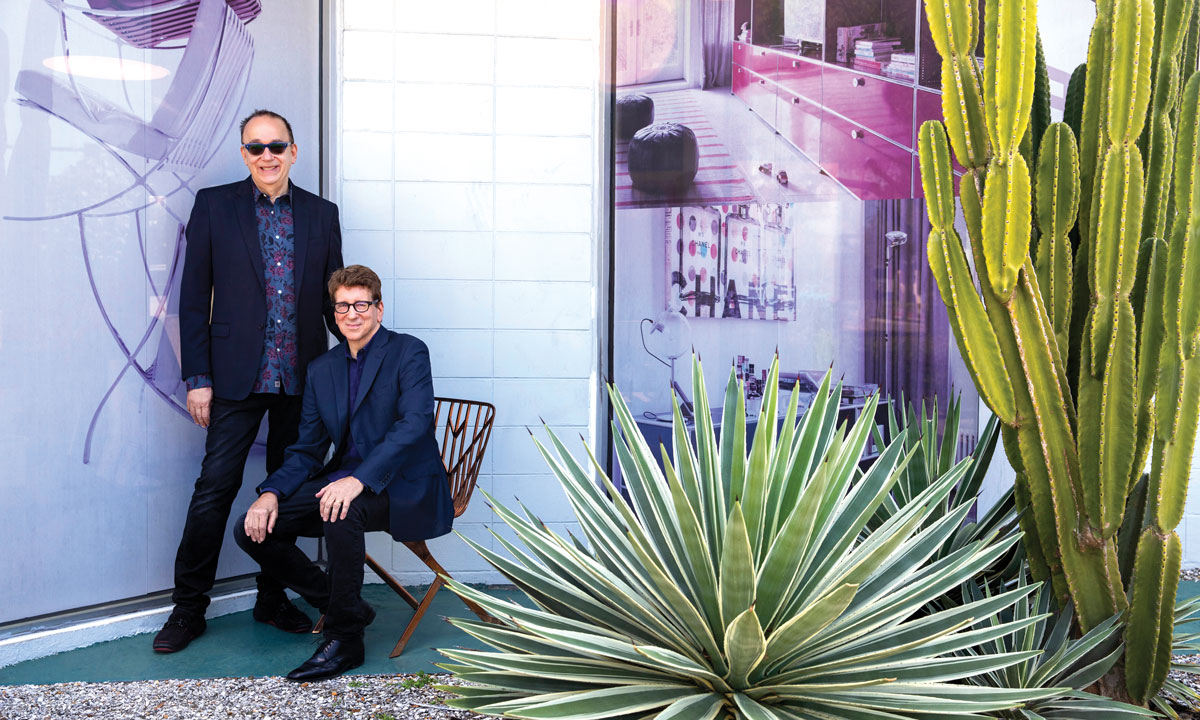
Ted Maines
Owner and President, Ted Maines Interiors
Jeffrey Miller
Partner and Shareholder, SeifertMiller
THE UNTIRING ACTIVISTS
It would take a spreadsheet the size of a bedsheet to
chart the array of public and private organizations across the political, cultural and social landscape of Winter Park and Orlando touched by power couple Jeffrey Miller and Ted Maines — and their partner Donatella, the media star of the threesome. Donatella, a 10-year-old Italian Greyhound, is co-couch — er, make that co-chair — of the annual Paws for Peace walk that benefits Harbor House of Central Florida, a shelter for victims of domestic abuse and their pets. Donatella, despite her sweet nature, is a forceful fundraiser when she pops up on billboards and appears on television shows. “When she’s on the screen the phone bank blows up,” says Maines, owner and president of Ted Maines Interiors. In April, Donatella’s sixth year as co-chair with Maines, the walk exceeded its goal and raised nearly $70,000. Over nearly three decades, Miller, 69, and Maines, 63, have served as volunteer leaders or event hosts for some 20 organizations devoted to causes ranging from ballet, fine arts and historic preservation to AIDS support, human rights, hospitals, libraries and Holocaust awareness. The 1993 March on Washington for LGBTQ rights lit the fuse on the couple’s activism. “Ted and I went and came back energized,” Miller says. They were founding members of the Rainbow Democratic Club and Central Floridians United Against Discrimination, which later became Equality Florida. Miller, a Lakeland native who attended law school at the University of Florida, and Maines, a New Jersey kid who majored in business management and accounting at Rutgers University, met in Key West in 1983. “It was love at first sight,” says Maines. But, given the tenor of the times, not marriage. The couple made it official in New York City, two years before the U.S. Supreme Court’s 2015 ruling that struck down prohibitions against same-sex marriage in every state. Maines, whose 27-year management career included a stint as CEO of Historic Creations Design and Development in Maitland, started his interior design business in 2010. Miller, who in the 1980s worked for what he describes as a “very conservative” downtown firm where he didn’t feel safe revealing his orientation, co-founded SeifertMiller, a personal injury and wrongful death practice, in 1996. Today, Miller and Maines are the most celebrated husband-husband team in local philanthropy and routinely appear on media-compiled lists of the region’s most powerful people. “There’s a certain obligation that comes with that,” Miller says, “an obligation to be that person who gets involved and tries to make the community a better place.” Their good works continued during the pandemic, though not at the same breakneck pace. Their laser focus these days is on construction of the new Holocaust Museum for Hope and Humanity in Orlando. Miller, past president of the Holocaust Center Board, is co-chair of the project, while Maines is on the fundraising committee. Donatella, of course, will help where she can.
THE BOTTOM LINE:
There are no Central Floridians more active in civic affairs than Ted Maines and Jeffrey Miller. Their current focus is on the new Holocaust Museum for Hope and Humanity, which could draw 75 million annual visitors to downtown Orlando.

Gus Malzahn
Head Football Coach, UCF
Kristi Malzahn
Wife, Mom, Booster
THE GOOD KNIGHTS
Billboards across Florida (and parts of Georgia) show a familiar fist-pumping coach alongside a UCF logo and a proclamation that “the future of college football is in Orlando.” The coach, Gus Malzahn, was tapped in February to helm the Knights, and believes that he can eventually deliver a legitimate national championship to an upstart program that brashly claimed the title for itself — to the amusement and annoyance of Alabama fans — in 2017. But the Knights had a strong case to make: In a Peach Bowl matchup, they had beaten the only team to beat the Crimson Tide in the regular season: the Auburn Tigers, then coached by — Gus Malzahn. Last year, in a shuffle apparently orchestrated by the football gods, UCF Athletic Director Danny White left to take the same job at Tennessee and took Head Football Coach Josh Heupel with him. White was replaced by former Arkansas State Athletic Director Terry Mohajir, who had worked with Malzahn during his first and only season coaching the Red Wolves. Mohajir might well have sought out a hot young assistant coach who would likely have bolted for a Power 5 program after a couple of good seasons with the Knights. Instead, he chose a battle-tested veteran who had powered through eight pressure-packed seasons in the SEC and had become one of only two active head coaches to notch three wins against Nick Saban (the other is former LSU Head Coach Les Miles). Malzahn, despite playing for a national championship (losing by a field goal to FSU) and compiling a 68-35 record, was let go by Auburn in 2020 following a sub-par 6-4 season. And so it was that Gus, 55, and his wife, Kristi, 52, took up residence in the City of Culture and Heritage — a place that Kristi describes as “a little utopia; it has such a warm and fuzzy feeling that it just draws you in.” Gus, who grew up in Fort Smith, Arkansas, and played football at the University of Arkansas and Henderson State, says UCF is a perfect fit because “the foundation is in place to take the next step — and I believe that more now than I ever have.” Kristi, an ebullient former insurance agent who now describes herself as happy to be a mom and a coach’s wife, says that she and Gus are interested in charities that help children. Gus has a particular fondness for the Boys & Girls Club, where he says he learned valuable life lessons as a youngster. The Malzahns, who met while she was an eighth-grader and he was a junior at Fort Smith Christian Academy, have two adult daughters, Kylie Peek and Kenzie Stander, and two grandchildren. So, is the future of college football really in Orlando? Perhaps — but it might be more accurate to say that the future of college football is in Winter Park.
THE BOTTOM LINE:
There’s no reason to believe that UCF didn’t make a great hire with Gus Malzahn, who isn’t looking to make a name for himself (he’s already done that) but is genuinely excited and energized by the opportunity here. Kristi, a funny and outspoken Southern charmer, is likely to have a high community profile and be a terrific ambassador for her husband’s program.
BREAKING NEWS
As this issue of Winter Park Magazine was going to press, the College Football Playoff expansion subcommittee announced that it was “strongly considering” increasing its championship field from four to 12 teams, with slots for the six highest-ranked conference champions and six more at-large selectees. Under the proposed new structure, UCF — a member of the Group of Five’s American Athletic Conference (AAA) — would have earned playoff berths in 2017 and 2018. A decision is not expected before September and would be unlikely to take effect before the 2023 season. What might this mean for fans of the Knights? For starters, the hometown team could compete for a national championship by dominating the AAA instead of by chasing an elusive affiliation with a Power Five conference.
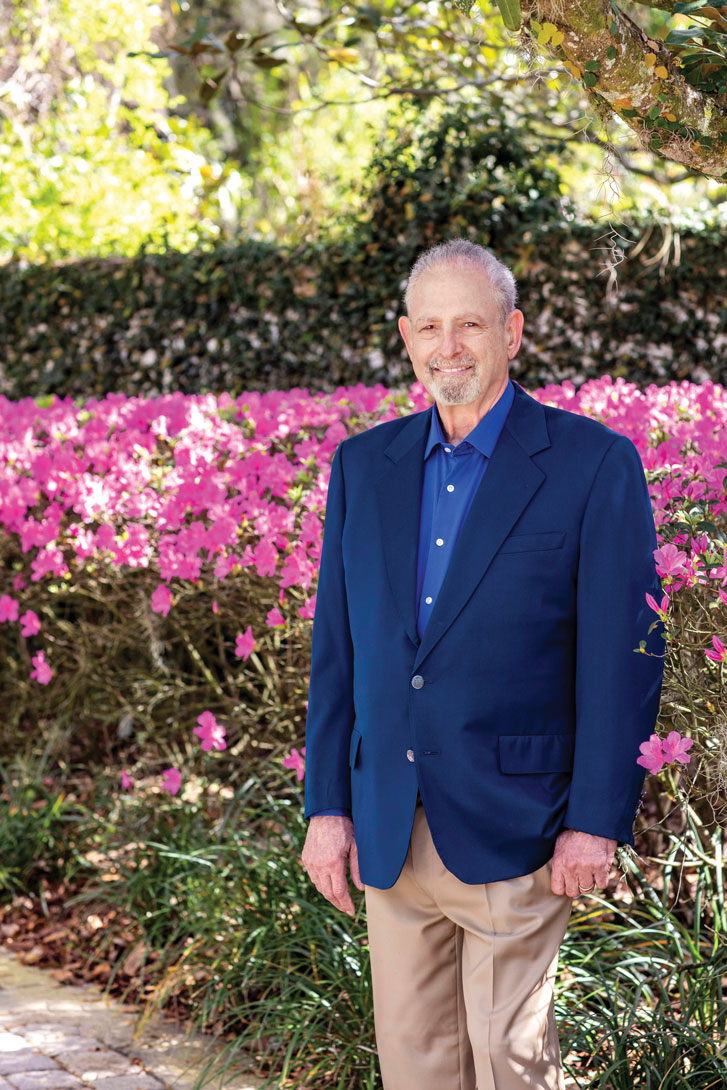
Robert A. Mandell
Public Servant
THE DEVELOPER DIPLOMAT
Not many people have been appointed to important posts by both President Obama and President Trump. But Robert “Bobby” Mandell — entrepreneur, attorney, developer and diplomat — can count two presidential nods among his accomplishments. In 2011, he was tapped by Obama to serve as ambassador to Luxembourg, where he remained until 2016. In 2019, he was named by Trump (who was required by statute to appoint a Democrat) to the board of directors of the Corporation for Public Broadcasting. Previously, he was one of the region’s most important homebuilders and chaired both the Florida Environmental Regulation Commission and the Orlando-Orange County Expressway Authority. He also served on the boards of AdventHealth Orlando and the Burnham Institute, and co-chaired a capital campaign for United Cerebral Palsy that raised $6.5 million for construction of the UCP Bailes Early Childhood Center in east Orange County. A Miami native, Mandell attended the University of Florida, where he earned a law degree in 1972. He practiced for a time in Punta Gorda, then joined Greater Construction Company, founded by his father, Lester Mandell, and his great uncle, Lester Zimmerman, along with associate Jack Lazar and land-use attorney John Lowndes. Mandell, who started as a laborer on construction sites, then held a succession of executive positions before buying the company in 1998. Following a 2005 sale to Arizona-based Meritage Homes, Mandell remained as president and chairman emeritus. He met Obama, a young U.S. Senator from Illinois, through Mel Martinez, a former Orange County chairman and then a U.S. Senator from Florida. “I had dinner with him and was mesmerized,” recalls Mandell, 73. Soon thereafter, Mandell became a major fundraiser for Obama, who had launched a longshot race against Hillary Clinton for the Democratic presidential nomination. We all know how that story turned out. President Obama would later appoint Mandell to the President’s Trade Council and nominate him for the ambassadorship. During his stint as a diplomat, Mandell started “The Luxembourg Forum,” which brought together the U.S. Supreme Court and the European Court of Justice, and the embassy “adopted” the nearby Kannerland orphanage. Mandell, a painter of unusual talent (he signs his work with the distinctive imprint “RAM”), is married to Julie Walker Mandell, and the couple has four adult children. He is now a partner in two healthcare-related technology companies.
THE BOTTOM LINE:
Mandell is indicative of a proud but frayed tradition of successful business people using their acumen to make the world a better place through government service.
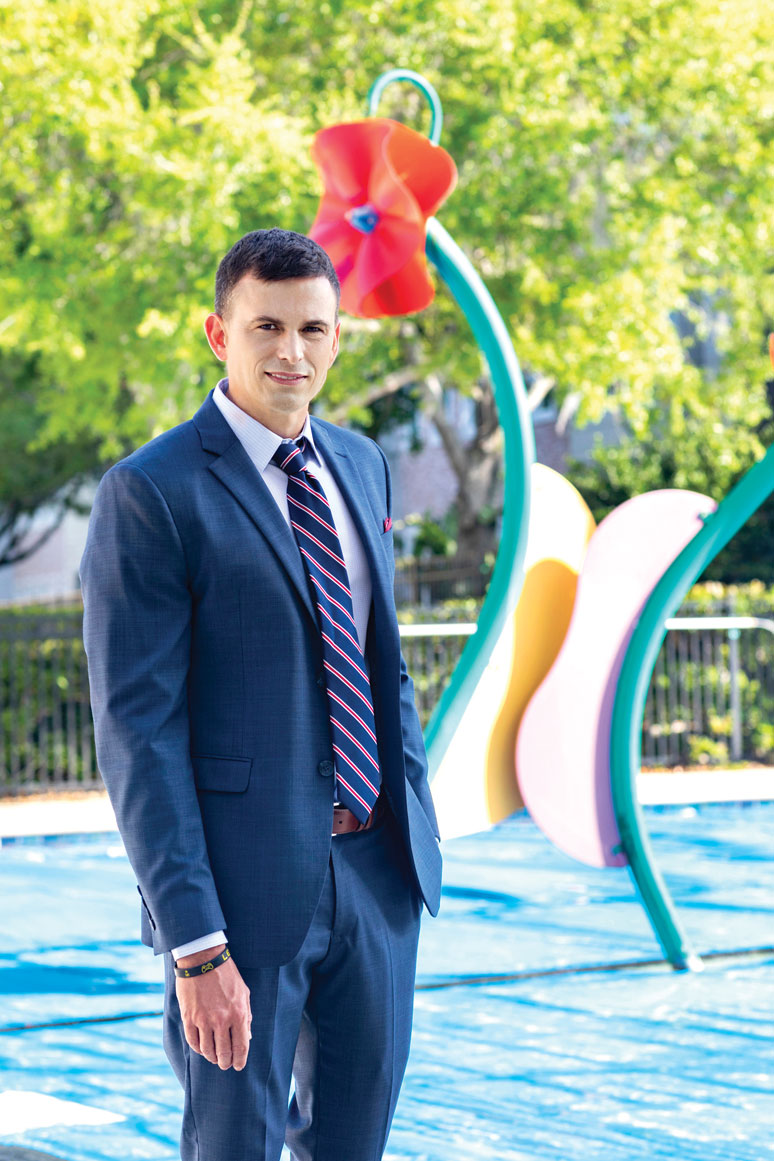
Jason Seeley
Director of Parks & Recreation, City of Winter Park
THE PARKS PROPRIETOR
Nowhere in Jason Seeley’s job description does it say he’s point man for dealing with overflowing trash cans and aggressive squirrels. He just wouldn’t have it any other way. “My number is on the website,” says Seeley, director of the city’s first-rate Parks & Recreation Department. “When a resident calls with a problem it doesn’t go to a secretary or assistant, it goes to me, no matter how large or small — like an aggressive squirrel in the park. It’s my job to handle the problem, not hope it goes away on its own.” Seeley is the anti-Ron Swanson, the grumpy parks director on the sitcom Parks and Recreation who believes “government is garbage” and seeks to undermine it. Overseeing a system with 11 parks, 14 mini-parks, seven playgrounds, two swimming pools, a golf course and a tennis center, Seeley does everything he can to counteract the image fomented by his TV counterpart. He grew up in a very conservative family, Seeley says, where the prevailing belief was that government workers “are sort of lazy and don’t do their job — I never want that said about the department I work in.” Seeley, 41, was born in Scranton, Pennsylvania, and moved to New Smyrna Beach when he was 16. He planned to teach and studied history at the University of South Florida while holding down — and enjoying — part-time parks jobs in Tampa. After graduating, he took a job as athletic and aquatic assistant with the City of Casselberry, which married his twin passions of teaching and parks. And the rest is history — a succession of parks and recreation gigs in Cape Coral, Dunedin and Seminole County before joining Winter Park in 2011 as chief of recreation before moving up to the director’s role in August 2019. Most locals who are involved in recreational programs know Seeley through his role as staff liaison to parks-related city advisory boards as well as to civic groups and youth sports organizations. He’s a graduate of Leadership Winter Park, a program of the Winter Park Chamber of Commerce, and with his wife, Bessie, has a son, Harrison, who’s in first grade. According to Seeley, “being able to come to work for the City of Winter Park and lead this department is my proudest achievement.” Ron Swanson would never understand.
THE BOTTOM LINE:
For local residents, few if any city perks are more important than beautiful parks and robust recreation programs. For the service-focused Seeley, delivering what residents expect and demand is as much a passion as a job — an attitude that makes him effective and has endeared him to those who believe that such amenities are crucial to the enviable quality of life Winter Park.
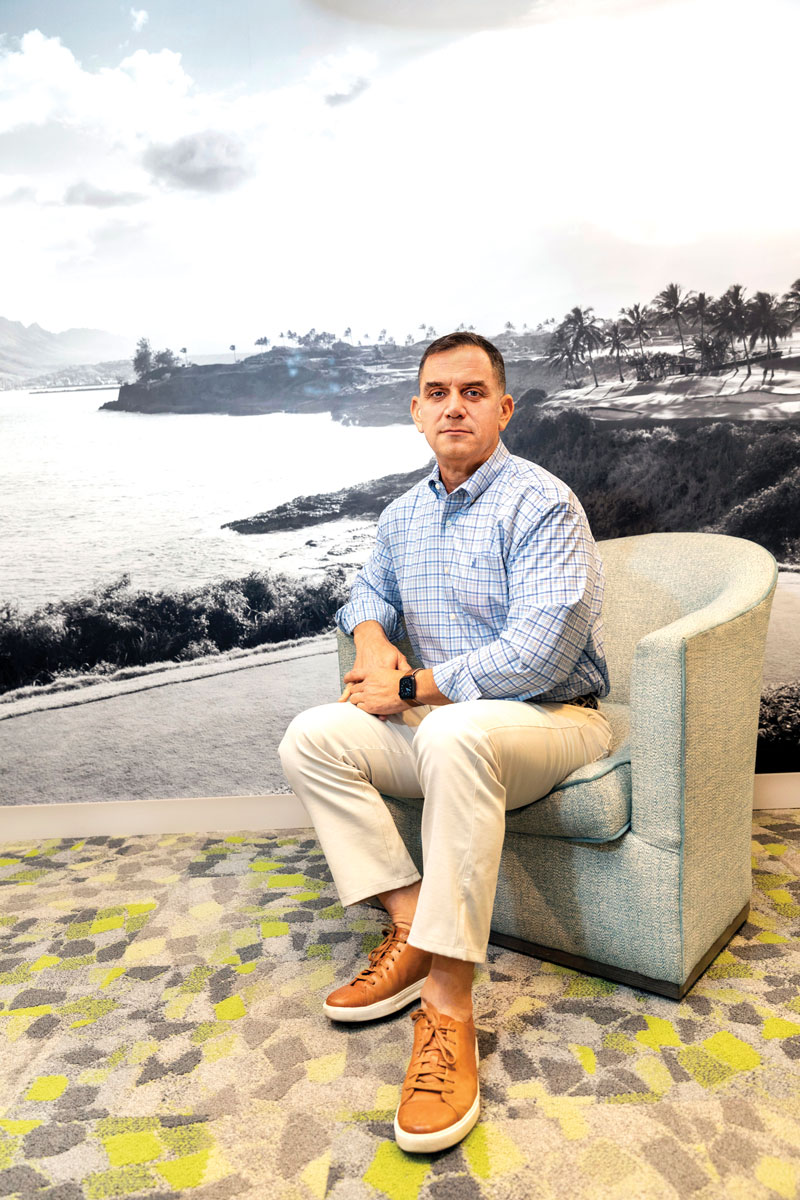
Greg Spencer
CEO, Timbers Resorts
THE DREAM BUILDER
When Timbers Resorts CEO Greg Spencer began to investigate moving the company’s corporate headquarters from Carbondale, Colorado — a picture-postcard small town just northwest of Aspen — he wanted to find a location that combined sophisticated panache with top-notch schools and proximity to an international airport. Spencer, 51, who was born in Orlando, seemed to recall that Winter Park fit the bill in most respects. “The city was a fit for our brand and the ethos of our company,” says Spencer. “The kind of people who live in Winter Park would be our buyers.” Central Florida’s concentration of hospitality industry professionals was likewise a major plus, says Spencer. So, in February 2019, he and a handful of other Coloradans moved into West Morse Boulevard offices that were decked out to reflect the company’s mission — which is to develop and operate hotels, boutique resorts and posh private-residence vacation communities in alluring locations around the U.S. (and one in Tuscany, Italy). The company — which has $250 million in annual sales and a $2.5 billion portfolio of properties — employs 40-plus people in its Winter Park office. But that number could double as expansion opportunities put on hold by COVID-19 are revisited, including a new venture called Soleil Hotels & Resorts. Wherever the company has a presence, corporate citizenship is emphasized. Before the paint was even dry at headquarters, Timbers Resorts had committed to sponsorships for the Taste of Winter Park and Ye Olde Hometown Christmas Parade. Spencer, who joined the company in 2007 as a project manager, holds a B.S. in political science from Florida State University, where he was an ROTC corps commander. He became a logistics officer in the Air Force and left military service as a captain, joining Andersen Consulting (now Accenture) in Atlanta and specializing in major bank mergers. He later earned an MBA from Webster University and another master’s degree in real estate development from Columbia University. Spencer and his wife, Suzanne, a women’s health nurse practitioner, have two daughters: Avery, 7, and Morgan, 11. Family is more important now than ever to the hard-charging, globe-trotting CEO, who late last year was diagnosed with liver cancer following a physical examination prompted by the relocation. Luckily, the disease was caught early enough to successfully treat. Notes Spencer: “I guess you could say moving to Winter Park saved my life.”
THE BOTTOM LINE:
It was major coup for Winter Park to be chosen as the corporate headquarters of a prestigious international company. Best of all, its CEO is a native Central Floridian who values the city’s unique assets.
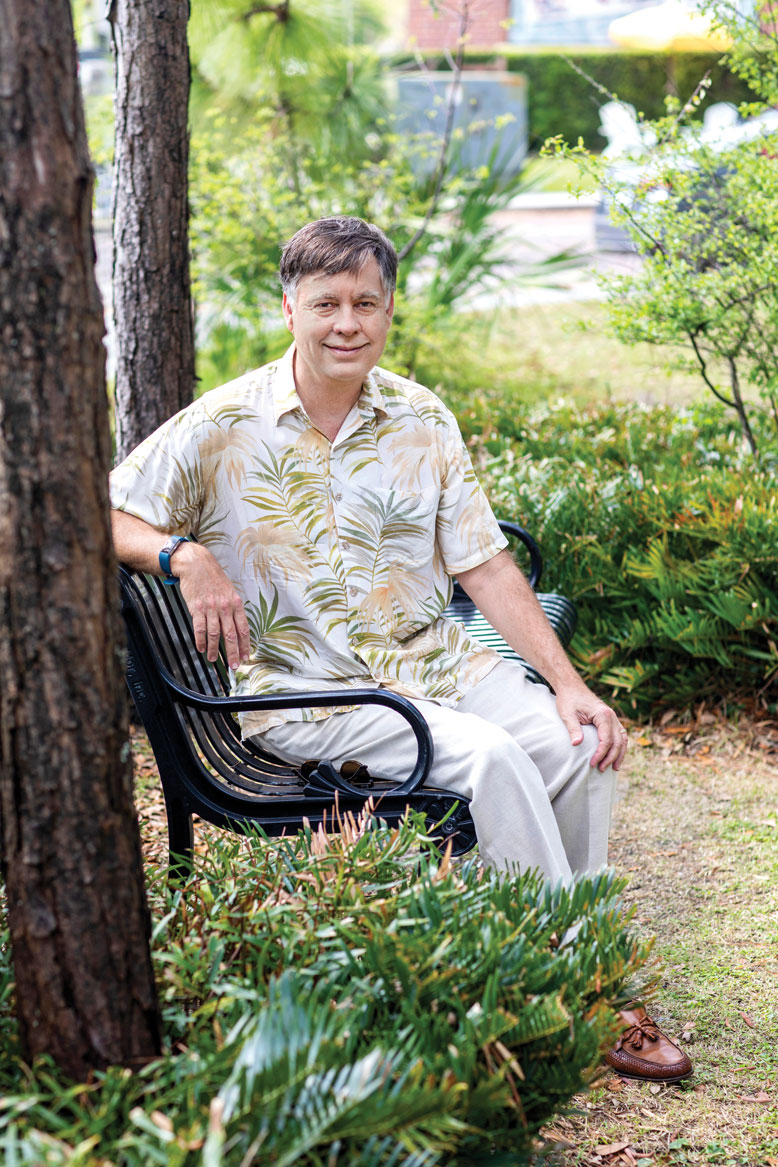
Bruce Stephenson
Professor of Environmental Studies, Rollins College
THE NEW URBANIST
If you’ve enjoyed all that is verdant, lush and canopied in Winter Park, it’s likely Bruce Stephenson has had something to do with it. The professor of environmental studies at Rollins College, a former city planner, is the go-to New Urbanism advocate in a city that holds its greenspaces sacrosanct. Stephenson helped craft the master plan for downtown’s Central Park, which has since led to its expansion, the placement of the SunRail station and, to Stephenson’s delight, a one-acre native garden that he works with his students. “It’s a hint of the wild nature right in the heart of Winter Park,” he says. Last fall, Stephenson’s efforts were recognized with the John Nolen Medal from the Congress for the New Urbanism. (Stephenson wrote an award-winning biography of Nolen, a visionary landscape architect who in 1923 designed the state’s first master plan, for the City of St. Petersburg.) His student-involved planning projects have led to the Cady Way Trail, the boardwalk at Mead Garden and — in collaboration with the Elizabeth Morse Genius Foundation — an ongoing restoration of the natural habitat at the Genius Preserve on Lake Virginia. Stephenson is known for bringing zeal, humor and persuasive research to the planning table. And he’s not afraid to be bold. One idea he has floated is connecting the Rollins campus to Interlachen Avenue with a pedestrian walkway beneath busy Fairbanks Avenue. Stephenson, 65, who joined the Rollins faculty in 1988, holds a bachelor’s degree from Florida Southern College, a master’s degree from Ohio State University and a Ph.D. from Emory University. And he not only preaches New Urbanism, he lives it; he gave up his car in 2015 and lives part-time in Portland, Oregon’s Pearl District, a prototype urban renewal project. His book, Portland’s Good Life: Sustainability and Hope in an American City, was recently published. Locally, Stephenson serves as a trustee for the Winter Park Land Trust and, with his students, helped to craft the nonprofit organization’s proposal for a 1.5-acre park at Progress Point — vacant city-owned property at the intersection of Denning Drive and Orange Avenue. The park, he says, would eventually become the most prominent gem in an “emerald necklace” of parks and greenspaces. Notes Stephenson: “If you can create synergy with this park on Orange Avenue like Central Park has with Park Avenue, then everybody wins.”
THE BOTTOM LINE:
Stephenson’s voice will be important at a time in Winter Park when redevelopment is revving up and many new projects cause controversy. He’s an environmentalist who also understands how smart, mixed-use development can enhance a city’s appeal.
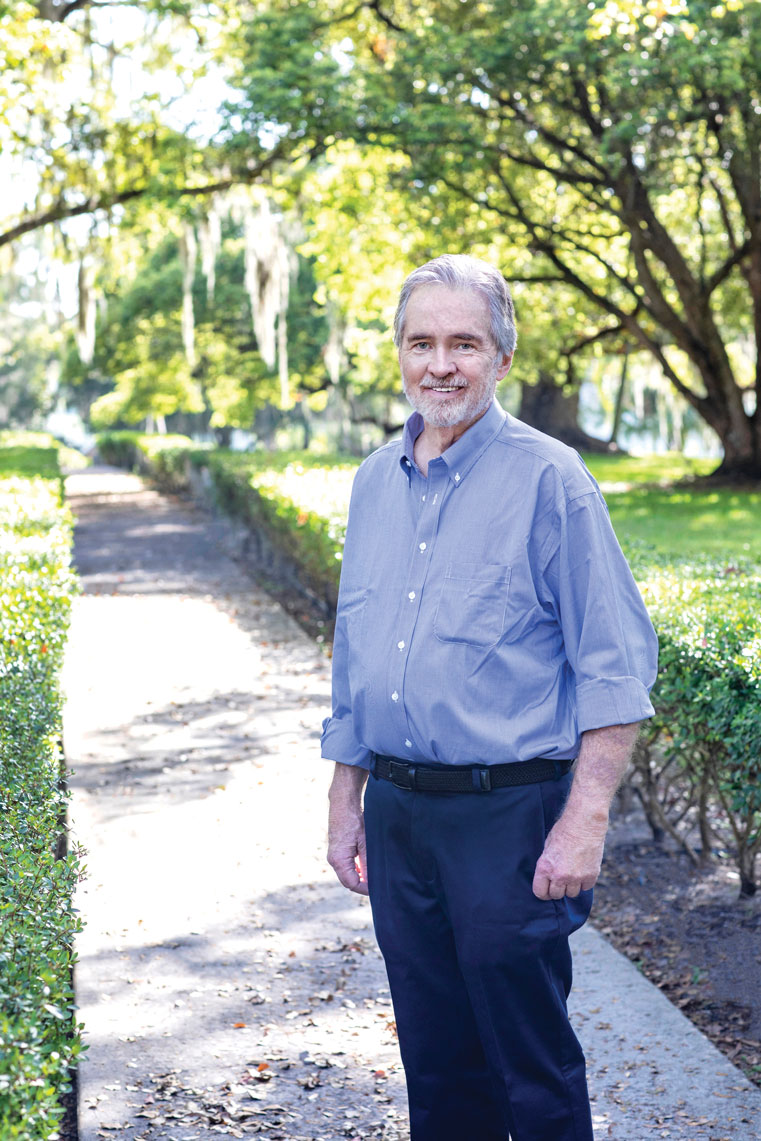
Richard Strauss
Trustee, Treasurer, Executive Vice President, Elizabeth Morse Genius Foundation and Charles Hosmer Morse Foundation
THE LEGACY KEEPER
Richard Strauss remembers walking a couple of steps behind Hugh McKean as the former Rollins College president led Sir Gus, the kissing camel, to the middle of Central Park. The gentle animal, owned by Orlando’s Bahia Shrine, was a featured attraction at Christmas in the Park, an event launched in 1979 by the Charles Hosmer Morse Museum of American Art. McKean and his wife, Jeannette Genius McKean, founded the museum, which is renowned for its collection of works by Louis Comfort Tiffany. “It kind of chokes me up a little bit,” says Strauss as he explains that, like the crowds who turned out, McKean was a big Gus fan. So much so, in fact, that he mused aloud about buying his own camel — and wondered whether it should have one hump or two. Ultimately, Strauss wasn’t sent camel shopping — but would have happily done so if asked. “Mr. McKean was delightful in that I never knew what to expect,” says Strauss, who was chosen by the McKeans more than three decades ago to manage the business and investment assets of the Elizabeth Morse Genius Foundation and the Charles Hosmer Morse Foundation, which honor the memories of Jeannette’s mother and grandfather, respectively. The Morse Foundation owns the Morse Museum, while the museum’s funding comes primarily from the Genius Foundation, which also supports an array of other good causes. The Genius Foundation’s holdings in Winter Park alone include the 50-acre Genius Preserve and more than 20 revenue-producing commercial properties. Strauss, 78, believes that his most important role is carrying on the McKeans’ legacy of bringing beauty to the community they loved. It’s a privilege, he says, to have worked so closely with these community icons — whom he still respectfully refers to as “Mr. McKean” and “Mrs. McKean.” A Pennsylvania native — something he shares with Hugh McKean — Strauss graduated in 1963 from the Keystone State’s Washington & Jefferson College with a degree in economics. He began his career in accounting and finance with Westinghouse but sought a warmer location and moved to Central Florida in 1979. He joined the Winter Park Land Company — incorporated by Charles Hosmer Morse in 1915 — as general manager in 1988. Strauss and his wife, Marianne, have six adult children as well as grandchildren and great-grandchildren. Says Strauss: “When you love what you do, then it’s not really a job.”
THE BOTTOM LINE:
Strauss, a walking repository of local history, was tapped by Hugh and Jeannette Genius McKean to deploy their assets for the good of the city — and, along with trustees of the two foundations, he takes that responsibility seriously.

Julie von Weller
Owner, Freshly Cast
THE TEAM BUILDER
Julie von Weller, 40, runs a women’s fashion consulting business and is mom to two children: Caitlin, 12, and Cade, 8 — “kind souls,” she calls them. Her husband, Ryan, is managing director of a company that develops affordable and workforce multifamily housing. She also consults for Winter Park-based ACi Architects, where her father, Larry Adams, is founder and CEO. Let’s face it: Von Weller is busy — just like most people who juggle careers and families. But she found it worrisome that so few in her age cohort are involved in city issues or cast ballots in city elections — as evidenced by the 8 percent turnout of voters under age 50 in the March 2020 contest for two city commission seats. And she wasn’t alone. Consequently, like-minded young (defined as under age 55) residents coalesced on social media and a group called Winter Park Voter emerged. Its purpose was “to create a collaborative space for those in our peer group to find factual information and have their voices heard.” Von Weller, however, is not the group’s president or spokesperson. In fact, she says, Winter Park Voter doesn’t have a formal leadership structure and its followers don’t agree on every issue. Says von Weller: “If Winter Park Voter was about one person, it wouldn’t have grown organically the way it has.” On its Instagram and Facebook pages, the loosely configured coalition has encouraged participation in city meetings. It has co-sponsored a 2021 mayoral debate with Rollins College. And it has, on occasion, opined on controversial issues, such as its support of the now-rejected Henderson Hotel. It has also pushed for diversity on city advisory boards, dialogue surrounding single-member districts, and pandemic-era support for small businesses by occasionally prohibiting vehicles on Park Avenue and allowing restaurants and retailers to expand their outdoor footprints. Through a Fund Our Fields social media push, the group successfully advocated for drainage and turf improvements on sports fields at Ward Park and Martin Luther King Jr. Park. Von Weller, who has a degree in public relations from the University of Florida, is herself a force of nature, collaborating with women to refine (or redefine) their personal styles through Freshly Cast, her small business, and volunteering for Support Our Scholars and Habitat for Humanity of Winter Park-Maitland. She’s a former president of the Park Avenue Merchants’ Association (she co-owned a boutique, Thread, for six years) and in 2013 raised funds to expand the YMCA of Central Florida’s “Links 2 Learning” program for disadvantaged youth. “Oh, don’t ever tell me I can’t do something,” she says. “Because if you do, you’d better believe I’m going to find a way to make it happen.”
THE BOTTOM LINE:
Von Weller has a get-it-done ethos and a vision for making Winter Park a place where everyone can constructively participate in problem solving.

